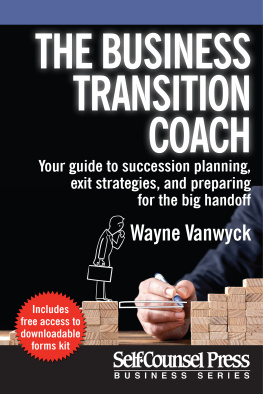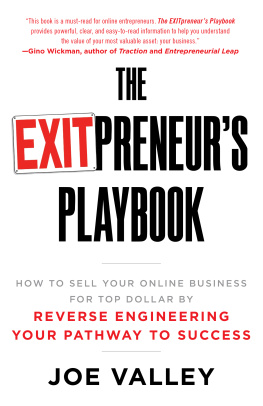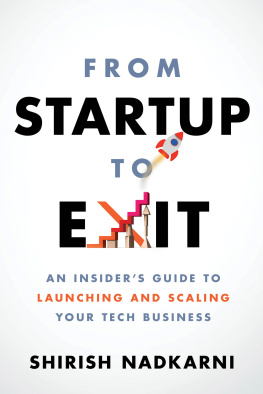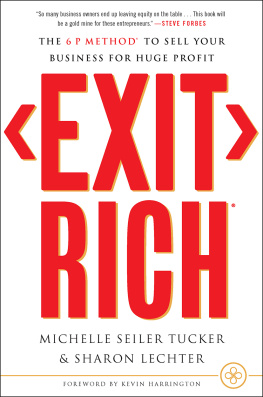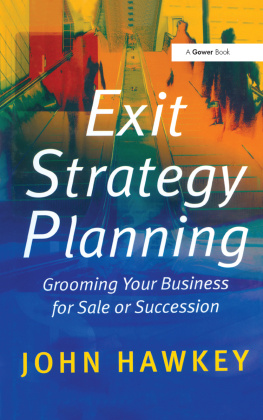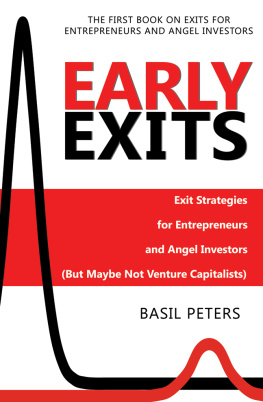Table of Contents
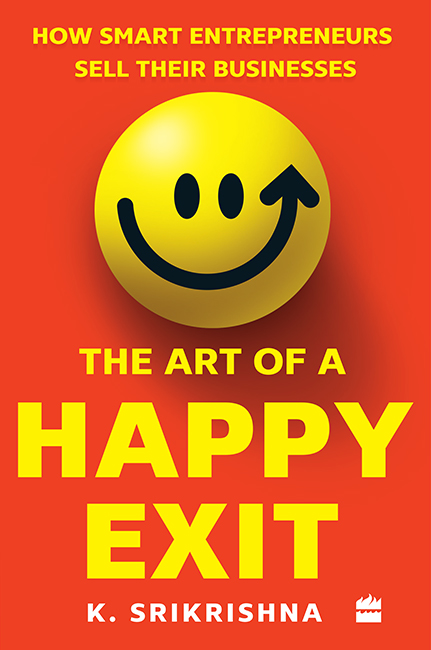

For my wife Chitra, who has kept the faith all these years and
my daughters Ragini and Malini,
who wish there were more women entrepreneurs
featured in this book
Knowing yourself is the beginning of all wisdom.
ARISTOTLE
CONTENTS
I t was a January day in 2006. Wed gotten together for a celebratory dinner. Hands had been shaken, toasts raised, and the deal consummated. Impulsesoft, our seven-year-old start-up, had been acquired by a NASDAQ-listed firm. My co-founders, our bankers, the chief executive officer (CEO), and the co-founder of the firm that had bought our company were seated around the dinner table, lulled by the low lighting, free-flowing beer, and somewhat heavy Punjabi food. Between the main course and dessert, I found my mind wandering. The others talking in hushed tones faded into the background.
It had taken us just shy of nine months to sell our business. Seven years earlier my co-founders (then aged twenty-three) and I had bootstrapped a wireless software company. We overcame many challenges to eventually not just break even, but achieve a global leadership position in our niche. The selling process took as long as our investment bankers had told us it would. Id learned almost as much on the journey of selling our business as I had since starting it. Id definitely come to realize many things I had no clue about even whilst running a business somewhat successfully. As I got pulled back into the what should we have for dessert discussion, little did I realize the mistakes wed already made, were yet to make, and all that I still had to learn.
Over the next two years, we attempted to marry our companies and evolve new strategies, products, and revenue streams. In this time, I had ample opportunity to reflect on what lessons wed learned both during and after the sale of our business. Like many of lifes important lessons, once we learned them they seemed self-evident. Yet, as we toasted the closure of the transaction that evening, I simply didnt realize what lay ahead.
In the decade since, as an angel investor, advisor to start-ups and mentor to entrepreneurs, I have had the opportunity to observe numerous start-ups and not-so-young enterprises go through a process of merger, partial acquisition, or outright sale. As a professor of Entrepreneurship and Innovation, first at The Ohio State University and then at Northeastern University, Ive had the opportunity to invite, hear the stories and learn from the insights of not just entrepreneurs, but also accountants, lawyers, and venture capitalists. One such guest lecturer was Barry Chandler, co-founder and CEO of Storyforge.
Why Am I Not Happier?
| Company | Chandler Interactive |
| Business | Digital marketing for bars |
| Entrepreneur | Barry Chandler |
| Role | Founder |
| Founded | 2010 |
| Exited | 2012 |
| Sale Value | Undisclosed |
Barry Chandler is no novice entrepreneur. Storyforge is his fourth start-up. He co-founded his first company, Barkeeper.ie, in Ireland in 2004. The business began as a resource for bar owners by providing articles, tools, and templates to better manage business. In the same year, he founded Stocktaking.ie, which helped Irish bars improve profitability by taking stock of their inventory, just as its name suggested. The success and lessons of these businesses led Barry to make the move to the United States of America (USA), where he founded ManageYourBar.com in 2008.
Barry, who was formally trained in food and beverage management, never lost his focus on who his customer was, even as he ran businesses across two countries. Two years after his move to the US he further sharpened his focus to being primarily a marketing resource for the food and beverage industry, by founding Chandler Interactive. The rapid growth of his newest venture attracted the attention of an industry leader, who offered to acquire it.
In December 2012, Barry sold Chandler Interactive to a publicly listed firm and stayed on board, excited to take the business to newer heights with the vast resources of the acquiring firm.
He figured his dream had finally come true. He had not only sold his company but had relocated to sunny San Diego and taken on the role of chief marketing officer (CMO). Yet within months he began to feel if this was what every entrepreneur hoped for, why wasnt he happier? The shine was off the apple, and Barry found himself wondering whether hed made a mistake.
In his own words, Not long after I settled into my new company, new home, new city in a new state, it started to dawn on me. The thing I had spent five years building was now no longer mine. My team worked for someone else. My clients, whom I had worked with for years, were no longer my clients. I had spent ten years waking up every morning to figure out my business and to try and make it grow. Now I would be waking up to grow someone else's business. Not the end of the world, but a different prospect nonetheless, he says.
I wasn't a business owner any longera title that had defined me for so long. I felt naked, and almost without an identity. I would no longer make all the big decisions alone. I would need to explain my reasoning, my thoughts, my instinct. Barry further discovered that the buyers of his business did not have the same sharp focus on how to best serve their customers. The strategies articulated to him prior to the acquisition and for which he was responsible in his new role as the CMO were only the flavour of the week or month, he says.
As a businessman, whose strong focus had helped his businesses thrive over the previous eight years, Barry began questioning himself. Had he done the right thing in selling his business? Of course, his friends and peers thought he was crazy when he voiced his doubts. Their view from outside was that Barry was living the dream in sunny San Diego, with a fancy office and money in the bank. After all, he was still the person in charge of all of marketing. What more could he want?
Barry, never one to throw in the towel, approached this problem like an entrepreneur. He hired an external consulting firm and rallied his management team to develop a set of goals, a strategy to achieve them, and specific tactics to deploy. However, even before the ink was dry on the new plan, he found his bosses were off chasing something new altogether. The culture of the firm that he had tied his fortunes to was one of perennially changing strategies and tactics.
Barry could no longer deny the obvious. As he recounts it, Six months after selling my company and moving to California, I was notified that my business no longer fit with their strategy. They were going to shut it down. Get rid of the clients, get rid of the team. It astounded him to realize, how quickly a life-altering decision like that could be made. Maybe I would be the next to go. And then what? I no longer had a business, my clients were gone, I was completely dependent on a CEO that I didn't know that well. If I was worried before, I was terrified now.
Barry Chandler is by no means alone.
Why This Book?
Most first-time entrepreneurs are ill-prepared when it comes to selling their business. Even for experienced entrepreneurs, including those who plan well before starting up, little thought is given to how it might end. Start-ups that raise investment from venture capitalists or institutional investors are commonly asked about their exit strategies. All too often, exits are an abstract idea at this stagesomething thatll happen in the future. They are not seen as a specific project, with clear objectives or milestones defined. Yet each year, tens of thousands of businesses are bought and sold.



